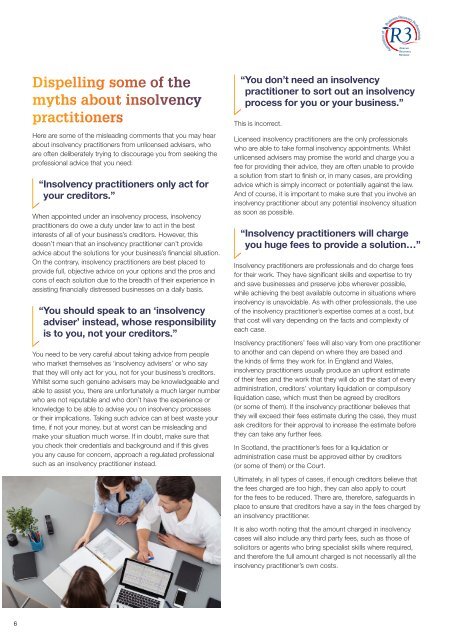My business is in financial difficulty…
R3_Unregulated_Adviser_Guidance_-_Business_JUNE_2016
R3_Unregulated_Adviser_Guidance_-_Business_JUNE_2016
Create successful ePaper yourself
Turn your PDF publications into a flip-book with our unique Google optimized e-Paper software.
D<strong>is</strong>pell<strong>in</strong>g some of the<br />
myths about <strong>in</strong>solvency<br />
practitioners<br />
Here are some of the m<strong>is</strong>lead<strong>in</strong>g comments that you may hear<br />
about <strong>in</strong>solvency practitioners from unlicensed adv<strong>is</strong>ers, who<br />
are often deliberately try<strong>in</strong>g to d<strong>is</strong>courage you from seek<strong>in</strong>g the<br />
professional advice that you need:<br />
“Insolvency practitioners only act for<br />
your creditors.”<br />
When appo<strong>in</strong>ted under an <strong>in</strong>solvency process, <strong>in</strong>solvency<br />
practitioners do owe a duty under law to act <strong>in</strong> the best<br />
<strong>in</strong>terests of all of your <strong>bus<strong>in</strong>ess</strong>’s creditors. However, th<strong>is</strong><br />
doesn’t mean that an <strong>in</strong>solvency practitioner can’t provide<br />
advice about the solutions for your <strong>bus<strong>in</strong>ess</strong>’s f<strong>in</strong>ancial situation.<br />
On the contrary, <strong>in</strong>solvency practitioners are best placed to<br />
provide full, objective advice on your options and the pros and<br />
cons of each solution due to the breadth of their experience <strong>in</strong><br />
ass<strong>is</strong>t<strong>in</strong>g f<strong>in</strong>ancially d<strong>is</strong>tressed <strong>bus<strong>in</strong>ess</strong>es on a daily bas<strong>is</strong>.<br />
“You should speak to an ‘<strong>in</strong>solvency<br />
adv<strong>is</strong>er’ <strong>in</strong>stead, whose responsibility<br />
<strong>is</strong> to you, not your creditors.”<br />
You need to be very careful about tak<strong>in</strong>g advice from people<br />
who market themselves as ‘<strong>in</strong>solvency adv<strong>is</strong>ers’ or who say<br />
that they will only act for you, not for your <strong>bus<strong>in</strong>ess</strong>’s creditors.<br />
Whilst some such genu<strong>in</strong>e adv<strong>is</strong>ers may be knowledgeable and<br />
able to ass<strong>is</strong>t you, there are unfortunately a much larger number<br />
who are not reputable and who don’t have the experience or<br />
knowledge to be able to adv<strong>is</strong>e you on <strong>in</strong>solvency processes<br />
or their implications. Tak<strong>in</strong>g such advice can at best waste your<br />
time, if not your money, but at worst can be m<strong>is</strong>lead<strong>in</strong>g and<br />
make your situation much worse. If <strong>in</strong> doubt, make sure that<br />
you check their credentials and background and if th<strong>is</strong> gives<br />
you any cause for concern, approach a regulated professional<br />
such as an <strong>in</strong>solvency practitioner <strong>in</strong>stead.<br />
“You don’t need an <strong>in</strong>solvency<br />
practitioner to sort out an <strong>in</strong>solvency<br />
process for you or your <strong>bus<strong>in</strong>ess</strong>.”<br />
Th<strong>is</strong> <strong>is</strong> <strong>in</strong>correct.<br />
Licensed <strong>in</strong>solvency practitioners are the only professionals<br />
who are able to take formal <strong>in</strong>solvency appo<strong>in</strong>tments. Whilst<br />
unlicensed adv<strong>is</strong>ers may prom<strong>is</strong>e the world and charge you a<br />
fee for provid<strong>in</strong>g their advice, they are often unable to provide<br />
a solution from start to f<strong>in</strong><strong>is</strong>h or, <strong>in</strong> many cases, are provid<strong>in</strong>g<br />
advice which <strong>is</strong> simply <strong>in</strong>correct or potentially aga<strong>in</strong>st the law.<br />
And of course, it <strong>is</strong> important to make sure that you <strong>in</strong>volve an<br />
<strong>in</strong>solvency practitioner about any potential <strong>in</strong>solvency situation<br />
as soon as possible.<br />
“Insolvency practitioners will charge<br />
you huge fees to provide a solution…”<br />
Insolvency practitioners are professionals and do charge fees<br />
for their work. They have significant skills and expert<strong>is</strong>e to try<br />
and save <strong>bus<strong>in</strong>ess</strong>es and preserve jobs wherever possible,<br />
while achiev<strong>in</strong>g the best available outcome <strong>in</strong> situations where<br />
<strong>in</strong>solvency <strong>is</strong> unavoidable. As with other professionals, the use<br />
of the <strong>in</strong>solvency practitioner’s expert<strong>is</strong>e comes at a cost, but<br />
that cost will vary depend<strong>in</strong>g on the facts and complexity of<br />
each case.<br />
Insolvency practitioners’ fees will also vary from one practitioner<br />
to another and can depend on where they are based and<br />
the k<strong>in</strong>ds of firms they work for. In England and Wales,<br />
<strong>in</strong>solvency practitioners usually produce an upfront estimate<br />
of their fees and the work that they will do at the start of every<br />
adm<strong>in</strong><strong>is</strong>tration, creditors’ voluntary liquidation or compulsory<br />
liquidation case, which must then be agreed by creditors<br />
(or some of them). If the <strong>in</strong>solvency practitioner believes that<br />
they will exceed their fees estimate dur<strong>in</strong>g the case, they must<br />
ask creditors for their approval to <strong>in</strong>crease the estimate before<br />
they can take any further fees.<br />
In Scotland, the practitioner’s fees for a liquidation or<br />
adm<strong>in</strong><strong>is</strong>tration case must be approved either by creditors<br />
(or some of them) or the Court.<br />
Ultimately, <strong>in</strong> all types of cases, if enough creditors believe that<br />
the fees charged are too high, they can also apply to court<br />
for the fees to be reduced. There are, therefore, safeguards <strong>in</strong><br />
place to ensure that creditors have a say <strong>in</strong> the fees charged by<br />
an <strong>in</strong>solvency practitioner.<br />
It <strong>is</strong> also worth not<strong>in</strong>g that the amount charged <strong>in</strong> <strong>in</strong>solvency<br />
cases will also <strong>in</strong>clude any third party fees, such as those of<br />
solicitors or agents who br<strong>in</strong>g special<strong>is</strong>t skills where required,<br />
and therefore the full amount charged <strong>is</strong> not necessarily all the<br />
<strong>in</strong>solvency practitioner’s own costs.<br />
6


